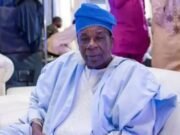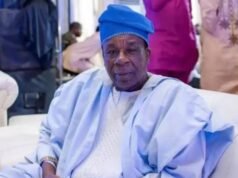The recent deposition of Emir Lamido Sanusi II has thrown up many issues both locally within the Kano metropolis and nationally and surely will be a topic for discussion for some time to come. However, my concern in this article is really not the deposition itself but an affiliated issue; the town to which the former emir was banished after the deposition. Seemingly more controversial than the deposition is the constitutionality of the act of exiling a monarch after deposition. This also has become belated since a court of competent jurisdiction has overturned the decision and the former emir has since left the now popular town of Awe for Lagos. The focus of this article is the town, Awe.
The hitherto barely known quiet Awe town has become popular for a rather controversial reason for which the town has become the pun of many discussions. In fact it was said in the heat of the crisis that Awe people begged the former emir not to leave the town. More important to me, however, is the confusion in some circle of Awe of Nasarawa State with my home town, Aawe in Afijio local government area of Oyo State. While the comments of some, including some of my friends, showed that Aawe is relatively known, these comments also show that the knowledge of some is at best peripheral. Comments such as “ilu Awe e ku alejo ex-Emir Sanusi Lamido Sanusi”; “I hope he will adjust to meals with ‘Oku Adie’ delicacy”; “Hope tourists that will visit Odo Sogidi during the emir’s will be sufficiently excited” and “I hope he will be in exile long enough to be special guest of honour at the next annual Awe Day” reflect a people with some ethnographic information about the town, albeit said jocularly. These comments also show that the commentators need some updating on the history of my home town of Aawe. I must say at this point, however, that the term ‘Aawe’ (with double ‘a’ is used in this article merely to create a distinction between the two Awe, although most writers used the versions interchangeably).
Let us start with Awe of Nasarawa State. Awe, the community to which the Emir was banished, is a small community and part of a larger Awe local government area of Nasarawa State. Other communities in the local government area include: Abuni, Anje, Akiri, Kofin Moye, Kekura and Mawangiji. The major tribes here include, Agatu, Alago, Eggon, Goemai and Lijili. It is noteworthy that majority of Awe people of Nasarawa speak Eggon, a unique dialect. Obviously, these people are different from the Aawe people of Afijio local government in Oyo State.
On the other hand, Aawe people of AFIJIO local government in Oyo State share the local government with other communities such as Akinmorin, Fiditi, Ilora, Jobele, Imimi, Iware, Ilu Aje, Ijaiye Ojutaye and Oluwatedo, all in Oyo state. Comparatively, the Aawe people of Oyo state are different from those of Nasarawa State and they of course, have no cultural ties. While the people of Nasarawa would trace their origin to communities farther to the North, the Aawe of Oyo is altogether of a Yoruba stock with a rich and cultural influence which is closely knitted to Ile-Ife, the cradle of Yoruba civilization.
As earlier said, Aawe is a town in the Afijio Local Government Area in Oyo state of south-western Nigeria. It is located between latitude 7040 and 7056 North and between longitudes 3056’ and 40 05’ East. It occupies a total area of approximately 422 square kilometres. Aawe town is 5.0 kilometres North of Ibadan, capital of Oyo State, and 55 kilometres South of Ogbomoso. It is about two-miles South-East of Oyo town. Like every other Yoruba towns and cities, Aawe shares in the multiplicity of rivers and streams flowing in a north-southerly direction, and nourishing the many farms, fishing enterprises, industries and commercial endeavours which defined the profession of most of its people.
Compared with other popular towns and cities of the historic Oyo people—cities like Ibadan, Ogbomoso, Iseyin, Saki or Oyo town itself— Aawe may be regarded as a small town. Yet, according to Geoffrey Streatfield, ‘facts speak louder than statistics.’ This implies that the comparative and geographical statistics which hold Aawe in evaluative diminution cannot in any sense diminish its immense significance in the historical scheme of things in Oyo itself. In the case of Aawe, statistics would constitute an ignorant science that often fails to take cognizance of the strong confluence of geography, history and people as the defining factors in the evolution of the social history of any place. Like most ancient towns, the origin of Aawe is anchored on several narratives of ancestral founding and apocryphal imaginaries. There are simply not enough sources for a deep historical reconstruction of the evolution of most ancient places. The most significant of the sources, orality, is mired in serious historiographical difficulties. And writing came very late to most of Africa. To understand how a town evolved simply implies approximating the best oral narrative that aggregates the most plausible of the contending historical narratives.
Yet, these original narratives perform a crucial function in the task of making sense of the thread of our futures and the kind of meaning we ascribe to our existence. According to Cicero, ‘to be ignorant of what occurred before you were born is to remain always a child. For what is the worth of human life, unless it is woven into the life of our ancestors by the records of history?’ It is in this vein that this article benefited from records kept by Rev. David Aibinu Olaopa on the history of Aawe.
Aawe began little and was founded by little men. The Aawe aborigines, who left Ile-Ife, according to the dominant historical narrative, belong to the Egba stock. Led by Ladun, these people undertook the usual founding migration through historical thick and thin that has been the subject of many mythological rendering in history. Ladun was a contemporary of Lisabi, the indomitable but tragic hero who was instrumental to the independence of the Egba from the old Oyo Empire. The Egba forest served as the home for the Aawe aborigines, together with other tribes—Akinmorin, Fiditi, Ilora, Jobele, Iware, Imini, Ilu Aje and Oluwatedo (whose names form the AFIJIO acronym today). They further migrated to their present location in the 16th century, and this was where the Oyo settlers met them while seeking refuge from the Fulani.
By the 17th century, however, a more dynamic group emerged to seek a settlement in the same region. This new group was led by a set of Ile-Ife princes, who had moved out of Ile-Ife after a series of misunderstanding about the measures taken to decide who wears the crown. They were Ilemolu Olatokun, Ladokun, Ikumawoyi, and Mafile. In their sojourn, they settled in an area popularly known as Egba Agura. After a while the princes, led by Ilemolu, moved again. This time their movement was inspired by some form of injustice which they could not stand. The effort to move for the second time towards Ife brought them to the area earlier settled by Ladun and others in the 13th century. It was this movement that led to the discovery of ‘Igi Aruwewe’ as instructed by Ifa divination.
Apart from their migratory experience, the Aawe aborigines distinguished themselves within their environment, made volatile by many wars around the ascendancy of the Oyo Empire. Many of its warriors participated in series of war resulting from aggressive neighbours and a domineering Oyo. Yet, there is no written or oral history or record that has shown that at any time in her existence Aawe was conquered, in spite of the fact that it had existed in the midst of wars and troubles. The philosophy of defence that serves Aawe as a mechanism against domination has its own advantage, apart from saving a town from the ravages of war. Aawe became a beacon of hope for other war-weary people all over Yorubaland. It became a town of refugee which required immense leadership and governance strategies to keep together people of diverse and often unruly dispositions. It does not take deep reflection, therefore, to see why Aawe would become a flourishing and progressive town in spite of its small size.
With difference infused within its cultural outlook, Aawe became a mosaic of multi-coloured perspectives on challenges and possibilities; a cultural study in complexity management. This diversity, no doubt, led to the enlargement of the collective intelligence and the capacity for adaptability. This enlarged intelligence made it possible for the succeeding generations of the Aawe aborigines to embrace Christianity (and Islam, of course, in equal measure). For instance, late in the 19th century the Aawe people grasped the immediate benefits of western education as a complementary dimension to their ubiquitous farming. Education therefore led to what we can now call a third migration away from Aawe to Lagos. Farming of course suffered immensely from the loss of able-bodied people. However, in the final analysis, it turned out that the people were investing in their own future. This future was defined around the continuous creation of a human capital pool of Aawe indigenes, especially those who left Aawe early in search of the Golden Fleece, and those who stayed behind to keep the home front from collapsing under the weight of compulsive emigration. What kept both group intact was their shared belief in the cultural unity of Aaweland founded many centuries ago under the Aruwewe tree in the Egba forest where it got its aboriginal name. Aawe town is therefore a critical study in historical becoming; a coming to greatness of ancient little people with a sense of historical mandate.
Let me digress here to address one of the comments of my friends which described Aawe people as eaters of “meals with ‘Oku Adie’ delicacy”. It was a case of conflict between a rural girl’s view and that of city minds. It was one of the Aawe girls who migrated to Lagos to serve as house-helps to the then growing corps of elite white expatriates and slaves-returnees community in Lagos who declared that there was nothing unhygienic in cooking and eating domestic fowls that were regularly killed by impatient Oyinbo vehicle drivers. This had embarrassed those present on the occasion who then described Aawe people jokingly as, “Aawe Aje Oku’ die”.
Despite the overwhelming challenges of development, Aawe has consistently retained the qualities of being the industrial nerve centre of the local government. Agriculture no doubt is the mainstay of Awe economy. Hence the primary occupation is farming. The farmers in the town cultivate a wide variety of food crops and cash crops. Prominent farm produce cultivated by the people include: cassava, yam, palm oil, beans, corn, grapefruits, plantain, banana, groundnut among others. The faming activities also include rearing of domestic animals, a practice which the Aawe people have sustained alongside farming. The people also engaged in hunting like other Yoruba communities, and they were experienced traders. Aawe is endogenously known for its pottery works, black soap making, woodwork, black smiting, just to name a few. Over the years, however, the quiet and homely town has evolved into a modern town with industries which are of remarkable standard when compared to those in the big cities like Ibadan and Lagos. This achievement is attributed to dynamic innovations by illustrious sons of Aawe, such as Chief J.A Ajao of J.A. Ajao Brothers, Chief Anthony Amoje of Amo Group of Companies, Chief P.O Ogunniyi and Sons, and Chief Debo Omotosho, the chairman of Bond Chemicals, who also owns Betty Hotel, the biggest hotel in Aawe. These are companies that are reputable and well sought after. Amo Group of companies is well known for making feeds and concentrates, and for consultancy services with a Laboratory to produce high-quality analyses. The Ajao farms are known to be among the very best when it comes to farm produce. Some of her produce includes pineapples fruits suckers, plantation fruit suckers, citrus fruits etc. many of which serve fruits juice companies, particularly in Lagos. In this category belong an Aawe daughter by adoption, Dr. (Mrs.) Yetunde O. Giwa, a notable educationist and school proprietress.
The entrepreneurial skills of Awe sons have also been quite remarkable at home and outside its borders. The hotel industry parades owners and managers like Chief Debo Omotosho of Betty Hotel, the biggest hotel in Aawe, Chief A.A. Adesakin of Adesakin Hotels, Chief P.O. Ogunniyi of Labamba Hotels, Col. Akinyanju of Retokin Hotel, and Alhaji Chief. S. B. Al-meen of Motel de Klob. These hospitality businesses have brought many people to enjoy the quietness and accommodating aura of Aawe town. They have served as a bridge between the town and the outside world.
Aawe’s historical greatness, therefore, lies in its capacity to tie its indigenous capital pool into a cultural collective dedicated to Aawe’s cultural renewal and developmental rehabilitation in the face of complex modern exigencies. The establishment, in 1982, of the Aawe Development Corporation (ADC) raised the stake beyond paying mere lip service to community development. The ADC thus became established as a ‘development agency’ to facilitate the management and financing of development activities in Aawe; to make the town more attractive in terms of tourism; and to ensure the implementation of different types of development efforts including those which raised the productivity of rural residents. It would also seem that the ADC effortlessly doubles as a democratic index, a framework for creating the socioeconomic dynamics through group mobilisation that enables the people themselves to participate in their own empowerment.
Aawe indigenes have achieved great successes and have been beacons of excellence wherever they found themselves. In the field of education, Awe has produced reputable Professors in the likes of Professor Ojetunji Aboyade, a renowned Economist and former Vice-chancellor of University of Ife (now Obafemi Awolowo University (Ile-Ife), Late Professor E. Latunde Odeku of U.C.H, the first African Neurosurgeon, as well as Professor Akande, a renowned Guru of Physics, Professor Tella, Profesor Titiola of NISER, Professors Aderibigbe, Akinyanju; Professor Ogunniyi of U.C.H Ibadan, Professor Kehinde of UNILAG, Professor Bayo Okunade, a Professor of Political Science and former director, Distance Learning Centre, University of Ibadan, and Professor Ayo Alagbe, professor of geology in ABU, Zaria, among other academics. There are also names like Hon. Justices Adebiyi and Atilade et al, Chief Emmanuel Adisa, a corporate chieftain who distinguished himself in the private sector, Dr. Ojefemi Aboyade. Aawe as growth point for the Baptist mission in Nigeria produced a number of first generation ministers of the gospel as Dr. J.A. Adegbite, (a former Principal of Baptist Academy in Lagos), Reverend D.A. Olaopa (a frontline Aawe leader, church leader, and first chairman of Afijio local government), Reverend Isaac Adejumobi (a Baptist leader), Reverend Gabriel Akinwunmi, Revd. Dr. S.T. Ola Akande, a former General Secretary of the Nigeria Baptist Convention, Bishop Magnus Atilade of the Gospel Baptist fame, to name just a few. Other Aawe notables are Chief J.A. Adesoji Adesipo, Ambassador Omolodun, Chief J.A. Adeshile and Chief S.A. Adebayo (an Aawe financial moguls).
Aawe boasts of some notable politicians such as Chief Adeola Odeku, Chief Bayo Owolabi and Hon. Seyi Adisa among many others. The town has equally produced seasoned civil servants, administrators and permanent secretaries such as Chief Alfred Olaopa, Chief P.O. Ishola, Mr. Obaleke, Alhaji Aruna, Alhaji Balogun, Chief Mrs. Peju Fajobi, Mr. T. A. Olaopa, Engr. Okikiade, Messrs Dokun Alagbe and Toyin Adeleye. Others are Dr. Tunji Bolade, Mr. Taiwo Abidogun, Noah Abiade Moninuola, amongst others. The list is not exhaustive.
There are school principals who have made great impact on their students like Chief J.O. Opatala, and other influential local chieftains as Deacon Sangokunle, among others. Obviously, these lists of Aawe’s illustrious sons and daughters are neither comprehensive nor exhaustive.
Like every other town of great historical founding, Aawe’s strength lies in those great names that are the testaments to its resilience and progress. But names are just the contingent investments in the course of socio-cultural development. Aawe is a small town that is adorned by many prominent names.
Yet, its greatest achievement lies in the aggregation of its diverse indigenous pool into a developmental capital that propels continuous advancement in social, cultural, economic and political terms. Aawe’s indigenous pool is made up of the expatriates abroad who invested in educational advancement and those, equally educated, who didn’t leave Aawe town but are committed to its advancement. Those at home and abroad are equally sensitised to the urgency of community development which has been facilitated over time through the framework of social groups. Both groups were united in the desire to modernise the collective aspiration of the Aawe community, especially in comparative reckoning. The continuation of this culture of inspiration and aspiration for the development of Aawe’s collective heritage is evident in the emergence of a new generation of Aawe sons and daughters under the canopy of the Aawe United Foundation which is currently creating a new veritable rallying point.
The capstone of all of these development and achievement in Aawe’s history is the kind of leadership that the people have been blessed with. Apart from the collective value of hard work and love for education, Aawe has been blessed with visionary leaders who have inspired the people to greatness. The current tempo and dimension of unity and drive in Aawe is attributable to the dynamic and visionary leadership of the current Alawe of Awe, Oba Cornelius Taiwo, a Chartered Accountant. Building on the heritage of Aawe’s forebears, Oba Cornelius and his enlightened style of governance has significantly enhanced Aawe’s status as an education brand. Also using cultural avenues such as the annual Sogodi Festival and the Aawe day celebration, the Alawe of Awe has continued to encourage unity among the indigenes of Awe both at home and abroad.
Prof. Olaopa is a retired Federal Permanent Secretary & Professor of Public Administration
tolaopa2003@gmail.com, tolaopa@isgpp.com.ng



































